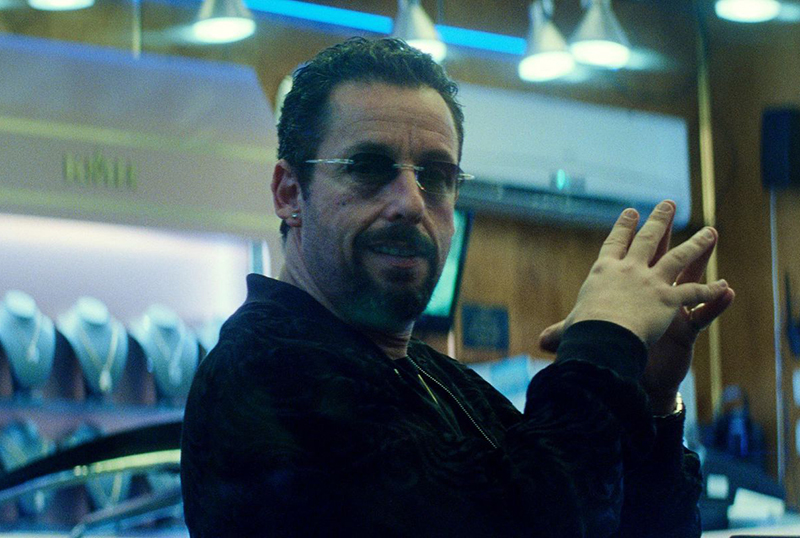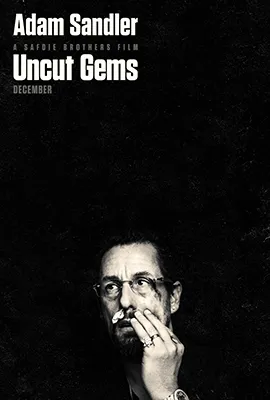Rating:
9.5/10
Cast:
Adam Sandler as Howard Ratner
Kevin Garnett as Kevin Garnett
Judd Hirsch as Gooey
Julia Fox as Julia
Lakeith Stanfield as Demany
Eric Bogosian as Arno
Idina Menzel as Dinah
Directed by Benny Safdie and Josh Safdie & co-written by Benny Safdie, Joshi Safdie, and Ronald Bronstein
Review:
Directors Josh and Benny Safdie, known for their ruthless and frenzied heist thriller Good Time, wouldn’t seem like the natural choice to work with an Adam Sandler well into his Netflix run, but if you’ve been waiting for something vibrant and different from Sandler, this is that special meeting of talent and material you want. Following Howard Ratman (Sandler), a shrewd and fast-talking New York jeweler, Uncut Gems presents equally as a crime thriller and an anxiety-inducing slice of life showcasing a magnetic sleazebag performance by Sandler.
As Howard, Sandler’s charisma isn’t suave or clean–it’s dirty, colorful, and alive with ambition. Seeing the world through Howard’s eyes is at first as jarring as the intrusive sound design that accompanies it. Beginning his day Howard passes stalls and shops in New York’s Diamond District, and dialogue from customers and vendors overlaps, though everyone’s only half-listening to the other party’s bravado and complaints, especially to Howard’s. His bookie’s engaged enough to take his bets, but Howard’s frustrated loan shark Arno (Eric Bogosian) and his two hired muscle quickly lose patience when Howard’s renewed promises to pay feel like at least the fifth version of the conversation. In these first minutes, the chaos of Howard’s day is matched by Daniel Lopatin’s synth-heavy score that overwhelms initially and remains a hypnotic barometer reflecting the pressure surrounding Howard, the darkness chasing him, and an almost cosmic connection to something larger.
He’s making bets, putting off loans, pawning pieces he’s just borrowed–Howard’s life of stressful disorder exists in a fragile shell of stability ready to crack. The unbalanced balance is first upset by the arrival in his shop of an incredibly valuable black opal from Ethiopia and then by the instantly captivating Kevin Garnett, playing himself. Howard can’t help but show off his impressive find and speaks to the opal’s possible million-dollar value, and we see in Garnett the emotional effect a rare object like this can have on a buyer (with money enough to follow the infatuation). As an actor Garnett slides into the anarchic dialogue as smoothly as Sandler and Lakeith Stanfield, playing a broker bringing the wealthy likes of Garnett to Howard’s shop. The tension felt in the room when Garnett, flouting his celebrity, asks to borrow the already-spoken-for opal for luck in his basketball game that night typifies the transactional nature of these relationships, which keeps these people who otherwise can’t seem to stand each other in the same room. Howard’s constant exaggerations, half-truths, and outright dodges test patience, but the chance at acquiring something beautiful or making money from a sale brings them peacefully enough together.
That’s not enough for everyone in Howard’s life–it’s clear from the doubt in their eyes and the way they brace themselves, ready to repel his charm offensive, that his business contacts, employees, and family know who he is. The people in Howard’s orbit who have chosen to remain there exist in various stages of a tumultuous cycle of skepticism, attraction, toleration, disillusionment, and ultimately resentment with his elusive magic and broken promises, with increasingly diminishing returns for the people closest to him who rely on him the most. His father Gooey (Judd Hirsch) expresses reluctance when Howard approaches him at Passover Seder about taking part in his latest scheme, but in spite of having little in common with his son’s turbulent lifestyle Gooey has also watched his son walk between the raindrops plenty–unlucky downpours now and then aside. Hirsch plays that beneath the wear and frayed edges of years with Howard there’s a genuine belief in his son’s abilities.
It’s telling that Gooey agrees to the scheme finally when Howard assures him that none of his father’s own money would be on the line, a detail that speaks to how all of Howard’s relationships have been warped by his obsession with his next play. Howard’s wife Dinah (Idina Menzel) is even less willing to put up with his games, staying with him for their kids’ sakes but steps away from divorce. Managing Howard’s selfish and erratic impulses while trying to give their kids the appearance of stability has long since hollowed out Dinah’s attraction to him, and Menzel cuts Dinah’s exhaustion with detached amusement. As Howard takes a wild swing desperately pitching her that they give their marriage another shot, Menzel’s intently cold gaze and straining composure could be mistaken for conviction about to crumble, but Dinah is now merely bitterly entertained by what she couldn’t see before. A tap dance like Howard’s can thrill if it didn’t have such a high cost, and watching this performance up close for so long has shown her how empty it is, probably even better than Howard can see.
Sandler displays a brilliance he hasn’t approached in years when scene to scene the demands by different parties trying to hold Howard accountable–Arno’s goons, Howard’s family, the auction house expecting the black opal–force him into a sweaty high-wire act as he moves on instinct alone. He swivels from lie to lie, his priorities blurring to us and seemingly to himself. Howard chooses to take ever greater risks that transform clear gains into all but certain defeats in the hopes they’ll pay off as gigantic wins. In a rare moment of quiet after taking a significant loss, Howard dares some self-reflection, and Sandler crumples into shame and deep insecurity, like a child shown for the first time their actions can have negative consequences.
Howard knows he’s hurting himself and the people around him, but he also loves the thrill of uncertainty and thrives on it. He’s, of course, found a way to put even more pressure on his marriage and business by dating his employee Julia (Julia Fox), but unlike Dinah, she sees the tornado of unpredictability and walks towards it. To Howard, there’s no loss he could take that would be so permanent he couldn’t spin it into another opportunity, and to be fair, watching Howard operate with complete self-belief, no matter how many times he’s come up short, can be both hilarious and mesmerizing, for Julia and for us. Sandler plays Howard’s abject failures, one landing him naked in the trunk of his own car, with complete deadpan and no sense of his own ridiculousness. These moments and his series of lies exhaust Dinah and Arno, but Julia and Garnett, with much less to lose and inspired by the allure of possibility that drives Howard, find something believable and magical in his words.
As more of his bets flop, Howard takes more shocking risks, and Uncut Gems ratchets the already ever-present pressure higher. The Safdies flourish in this tense space, but as they relentlessly explore the conflicts a constant gambler like Howard faces when he scrapes against the hard realities of the world, they also manage to push away those realities and grasp for something bigger and ineffable. Howard believes his world, no matter how dangerous, will always offer up opportunities for him to live in the moment of unfolding chaos and there do what he does best–and for him, unbelievably, the world complies. As Howard, Sandler embodies that flawed mentality and all its consequences wholly, evoking the experience of Howard’s external material world and more crucially the spiritual universe within.
Uncut Gems is now open in select theaters and will open wide on December 25!











